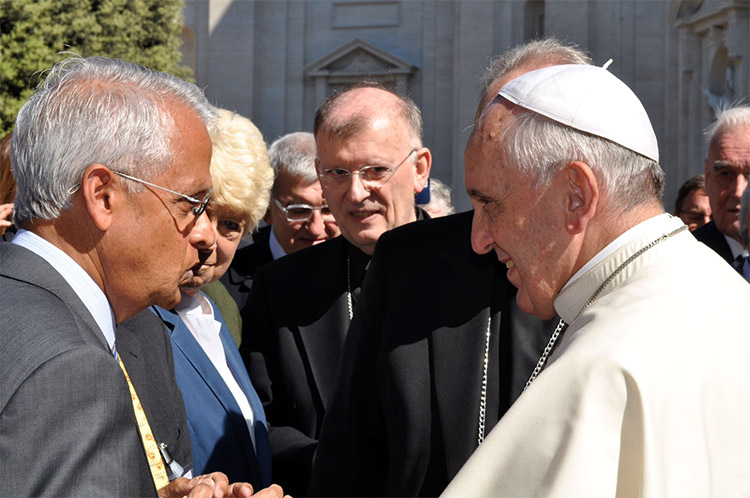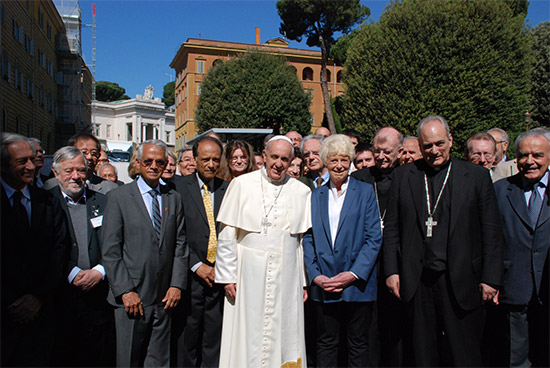
By:
- Robert Monroe
Published Date
By:
- Robert Monroe
Share This:
An Elevator Speech on the Need to Protect the Planet
Scripps climate researcher gets a word in with Pope Francis after convening historic joint workshop of two Vatican science academies

Image courtesy of the Pontifical Academy of Sciences
A historic gathering of scientists, economists and philosophers who advise the Vatican produced a declaration last week that sustainable development is essential to stop continued degradation of the planet and the rise of economic inequality. But it was the condensed version of that message that Veerabhadran Ramanathan will remember delivering. With only a few hours notice, the climate and atmospheric scientist at UC San Diego’s Scripps Institution of Oceanography found out that he would be meeting Pope Francis and would have only one minute to speak to him as the workshop concluded on May 6.
The message he delivered was that climate change has become a serious issue and the 3 billion poor people in the world who bear only a small responsibility for warming the planet, having never had access to the fossil fuels used by the more affluent, will bear the brunt of the worst effects of climate change.
Ramanathan said that he practiced saying that message in Spanish after hearing the Pope would better be able to communicate a response directly, but when the moment came, the rehearsed words vanished from his mind and he fell back on English.
“Pope Francis listened patiently with his characteristic disarming smile,” Ramanathan said. “I am very hopeful the declaration we produced will have an impact on his pronouncements.”
Ramanathan was appointed to the Pontifical Academy of Sciences in 2004 by Pope John Paul II. The workshop was the first he had organized under Pope Francis since the former Cardinal Jorge Mario Bergoglio assumed the papacy in March 2013. The meeting, “Sustainable Humanity, Sustainable Nature, Our Responsibility” was a joint workshop of the Pontifical Academy of Sciences and the Pontifical Academy of Social Sciences held May 2 to 6. Joining him in presiding over the summit were Chancellor of the Pontifical Academy of Sciences Marcelo Sánchez Sorondo, British economist Partha S. Dasgupta of Cambridge University, and His Excellency Archbishop Roland Minnerath, Archbishop of Dijon, France.

Pope Francis with members of the Pontifical Academy of Sciences and of the Pontifical Academy of Social Sciences. Image courtesy of the Pontifical Academy of Sciences
The joint statement of the two academies calls for the pursuit of social equality by a more equitable provision of greater access to energy resources among other prescriptives. However, statement authors also pointed out that the use of natural resources by relatively affluent societies is not sustainable, requiring a rethinking of resource use at all economic levels.
Renowned Columbia University economist Jeffrey Sachs joined Ramanathan, Dasgupta and Sorondo in drafting the statement. Among the signatories were six Nobel laureates and some of the world’s leading thinkers on sustainable development, climate change and economic justice. UC San Diego geophysicist Walter Munk, emeritus climate researcher Paul Crutzen, and former Scripps Director Charles Kennel also signed.
Kennel described the workshop as intense work, with one session lasting 12 hours straight. What set it apart from similar declarations from panels of scientists or social scientists was the breadth of its scope, he said. The workshop statement points out the commonality of the disregard that leads to societal problems as seemingly different as environmental destruction and human trafficking. The moral authority of the Catholic Church and other religious institutions to effect justice is essential, the authors said.
The statement asserts that “at the end of the day, unless human beings treat human beings well, they wouldn’t treat nature well and if they didn’t treat nature well, we wouldn’t survive as a civilization,” said Kennel.
Munk said it is his impression that existing civilization is technically competent to switch from fossil fuel to clean energy in couple of generations provided that clean nuclear energy is included.
“But whether it has the social and ethical standards for a truly international collaboration is the real challenge. The conference was an important step in that direction,” he said.
The workshop and the meeting with Pope Francis are part of what Ramanathan says is his campaign to prevail upon religious leaders to use their moral authority to promote better stewardship of planet Earth among their followers. In 2012, Ramanathan had a similar encounter with the Dalai Lama, who ended a brief one-on-one encounter with Ramanathan by pledging to work on the issue for the rest of his life.
The Scripps researcher said it is his hope that a message on the need for climate change mitigation will be woven by Pope Francis into a future encyclical, a letter issued by popes to Catholic bishops containing directives on religious matters.
Two Scripps graduate students, Matt Siegfried and Emily Kelly, were invited as observers to the workshop. Kelly described it as an incredible experience learning from an illustrious group of people on topics of sustainability, climate change, and human dignity.
“It has been a very exciting experience here and really building so much on my Center for Marine Biodiversity and Conservation education through discussions with ethicists, anthropologists, glaciologists, sociologists, economists, politicians, biologists, religious leaders, atmospheric chemists, labor organizers, and people of so many more disciplines,” said Kelly, a fifth-year student in the lab of Scripps marine biologist Jennifer Smith.
Ramanathan has met with John Paul II and his successor Pope Benedict XVI, who appointed him to the council of the academy in 2013.
In 2010, Ramanathan founded Project Surya (“sun” in Sanskrit), a Third World-based charitable effort to mitigate the emission of black carbon and other toxins from solid biomass cooking methods endemic to his native India, Southwest Asia, and vast expanses of Africa.
Project Surya provides solid-fuel, bio-gas, and solar stoves and lamps that greatly reduce smoke indoors and outdoors — and thus reduce the ill effects of pollution — for nearly 4 million poor people in developing countries. They pay a heavy price. About 3.2 million people die every year inhaling the toxic smoke, which is a major contributor to climate change.
According to the Pontifical Academy of Sciences, the panel has its roots in the Academy of the Lynxes (Accademia dei Lincei), which was founded in Rome in 1603 as the first exclusively scientific academy in the world. The Accademia dei Lincei achieved international recognition, and appointed Galileo Galilei as a member on 25 August 1610, but did not survive the death of its founder, Federico Cesi. In 1847, Pope Pius IX reestablished the Academy as the Pontifical Academy of the New Lynxes. Pope Pius XI renewed and reconstituted the Academy in 1936, and gave it its present name.
Share This:
Stay in the Know
Keep up with all the latest from UC San Diego. Subscribe to the newsletter today.


